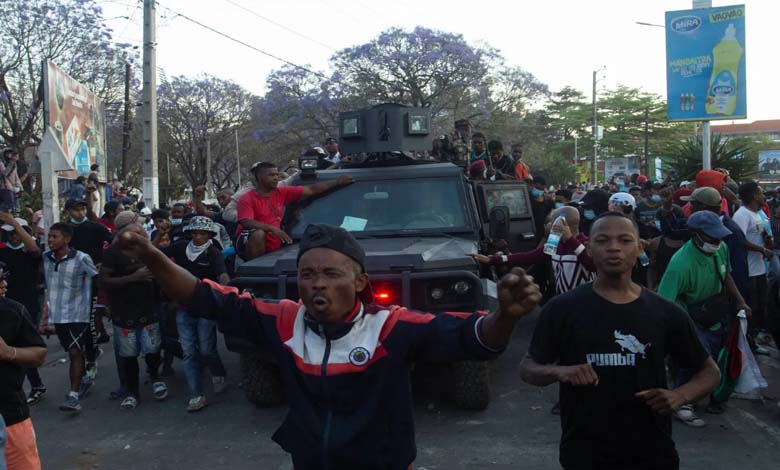An Attempt to Seize Power by Force: What Is Happening in Madagascar?

Madagascar’s President Andry Rajoelina announced on Sunday that “an ongoing attempt is being made to seize power illegally and by force.”
In an official statement, he said that “the Presidency of the Republic wishes to inform the nation and the international community that an illegal and violent attempt to take power, contrary to the Constitution and democratic principles, is currently underway on national territory.”
-
Rebellion in Madagascar: Military unit declares control over the army
-
Madagascar’s Gen Z protests enter a new phase as signs of army division emerge
The announcement came a day after soldiers joined thousands of anti-government demonstrators in the capital, Antananarivo, in a new escalation of the political crisis shaking the Indian Ocean island.
The soldiers joined protesters after a military unit, the “Capsat” (Corps of Personnel and Administrative and Technical Services) stationed near Antananarivo, called for disobedience and a “refusal to obey orders to fire” on demonstrators.
-
Political Events Awaiting Africa in 2025
-
Following his resignation, who is the Senegalese Abdoulaye Bathily, the former UN envoy in Libya?
This appeal is reminiscent of the same unit’s mutiny in 2009, during the popular uprising that brought Andry Rajoelina—then mayor of the capital—to power.
The soldiers were greeted with cheers and applause as they joined the march toward the May 13 Square, in front of the city hall of Antananarivo.
On Saturday evening, the newly appointed Prime Minister, Rovyne Zafisambo, stated that the “resilient” government was ready to cooperate and listen to all sectors of society, including youth movements, trade unions, and the military.
-
The backstage of the Comoros’ classification of the Muslim Brotherhood and the Houthis as terrorist entities
-
The COMESA Summit in Zambia: The path to African economic integration
Growing Public Anger
Since last month, thousands have been taking part in ongoing demonstrations in the capital, organized through social media by a youth movement calling itself “Generation Z.” The protesters are denouncing worsening living conditions and persistent water and electricity cuts across several regions.
The protests have become increasingly tense in recent days, with some members of the military joining the crowds, raising fears that the country could slide into another political and security crisis.
-
A Neo-Colonial Tool of Repression: Three African Countries Withdraw from the International Criminal Court
-
First Round of Political Consultations: The UAE Strengthens Its Partnership with the African Union
Accusations of Government Incompetence
Andry Rajoelina, 51, a former mayor of Antananarivo, first came to power in 2009 after a coup that ousted President Marc Ravalomanana. He ruled until 2014, was re-elected in 2018, and again in 2023 for a new term.
On September 29, Rajoelina dismissed his government and publicly apologized for “the ministers’ failure to address the nation’s crises,” pledging swift solutions to the electricity and water problems. However, this move failed to calm public anger, as hundreds returned to the streets last Tuesday.
-
African Union Forces Helicopter Crashes in Somalia
-
Gold and Drones: Alternative Funding and New Maps of Terrorist Threats in the African Sahel
According to the United Nations, at least 22 people have been killed and more than 100 injured since the protests began on September 25, while President Rajoelina reported only 12 deaths, calling them “saboteurs and thieves.”
Madagascar has experienced recurrent political and social unrest since gaining independence in 1960, amid repeated economic crises and enduring tensions between the government and the opposition. International actors have urged restraint and the preservation of the country’s democratic path.












